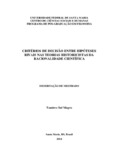| dc.creator | Magro, Tamires Dal | |
| dc.date.accessioned | 2014-10-03 | |
| dc.date.available | 2014-10-03 | |
| dc.date.issued | 2014-01-31 | |
| dc.identifier.citation | MAGRO, Tamires Dal. DECISION CRITERIA FOR RIVAL HYPOTHESES IN THE HISTORICIST THEORIES OF SCIENTIFIC RATIONALITY. 2014. 83 f. Dissertação (Mestrado em Filosofia) - Universidade Federal de Santa Maria, Santa Maria, 2014. | por |
| dc.identifier.uri | http://repositorio.ufsm.br/handle/1/9126 | |
| dc.description.abstract | The publication of Thomas Kuhn s The structure of scientific revolutions is considered a watershed in the philosophy of science for having presented scientific knowledge as produced by a dynamic and historically situated process. Many of the concepts introduced by the author sparked controversy in the initial reception of this work. We highlight in this dissertation Kuhn s theses on scientific revolutions, incommensurability, and scientific choice between rival hypothesis, which were interpreted by authors such as Popper, Lakatos, Laudan and Putnam as introducing elements of irrationality and relativism into Kuhn s analysis of scientific practice. In the first paper of this dissertation, we investigate passages from Structure that led to those interpretations, and track down Kuhn s later reformulations of the three controversial theses, which attempted to avoid or respond the criticisms of irrationality and relativism. We highlight the linguistic emphasis given by Kuhn in his later works to the concepts of incommensurability and scientific revolution, and show that his thesis about scientific choices remained nearly unchanged. We claim that in Kuhn s later works his theses became more precisely formulated and narrower in scope, and that they manifest a realist inclination by the author. The second paper of this dissertation develops in more detail the issue of the rationality of scientific choice. It presents briefly three theories of scientific rationality due to Kuhn, Lakatos and Laudan, and then shows some of the problems that Lakatos and Laudan s theories face due to focusing their notion of rationality on univocal rules of choice. We then indicate that there are advantages in understanding as Kuhn did the notion of rationality in terms of values that influence objectively the choices to be made without determining them univocally. | eng |
| dc.description.sponsorship | Coordenação de Aperfeiçoamento de Pessoal de Nível Superior | |
| dc.format | application/pdf | por |
| dc.language | por | por |
| dc.publisher | Universidade Federal de Santa Maria | por |
| dc.rights | Acesso Aberto | por |
| dc.subject | Kuhn | por |
| dc.subject | Revoluções científicas | por |
| dc.subject | Incomensurabilidade | por |
| dc.subject | Critérios de decisão entre hipóteses científicas rivais | por |
| dc.subject | Teorias historicistas da racionalidade científica | por |
| dc.subject | Regras | por |
| dc.subject | Valores | por |
| dc.subject | Kuhn | eng |
| dc.subject | Scientific revolutions | eng |
| dc.subject | Incommensurability | eng |
| dc.subject | Decision criteria for rival scientific hypothesis | eng |
| dc.subject | Historicist theories of scientific rationality | eng |
| dc.subject | Rules | eng |
| dc.subject | Values | eng |
| dc.title | Critérios de decisão entre hipóteses rivais nas teorias historicistas da racionalidade científica | por |
| dc.title.alternative | Decision criteria for rival hypotheses in the historicist theories of scientific rationality | eng |
| dc.type | Dissertação | por |
| dc.description.resumo | A publicação de A estrutura das revoluções científicas, de Thomas Kuhn, é considerada um divisor de águas na filosofia da ciência por apresentar o conhecimento científico como sendo gerado por um processo dinâmico e historicamente situado. Muitos dos conceitos introduzidos pelo autor foram motivos de controvérsia na recepção inicial da obra. Destacamos na presente dissertação as teses de Kuhn sobre revoluções científicas, incomensurabilidade e escolhas científicas entre hipóteses rivais, que foram interpretadas por autores como Popper, Lakatos, Laudan e Putnam, como introduzindo elementos de irracionalidade e relativismo na análise kuhniana da atividade científica. No primeiro artigo desta dissertação, investigamos as passagens na Estrutura que levaram a essas interpretações, e rastreamos as reformulações kuhnianas posteriores para as três teses controversas com vistas a evitar ou responder as críticas de irracionalidade e relativismo. Destacamos a ênfase linguística dada por Kuhn aos conceitos de incomensurabilidade e revolução científica, e mostramos que a tese acerca das escolhas científicas permanece quase inalterada nos textos tardios. Defendemos que na obra tardia de Kuhn suas teses tornaram-se mais precisas e menos abrangentes e evidenciam uma inclinação realista do autor. O segundo artigo desta dissertação desenvolve de maneira mais detalhada a questão da racionalidade das escolhas científicas, apresentando as propostas de três teorias historicistas da racionalidade científica, devidas a Kuhn, Lakatos e Laudan. Apresentamos alguns dos problemas que as teorias de Lakatos e Laudan enfrentam ao concentrar a noção de racionalidade em regras unívocas de escolha e indicamos que há vantagens em se compreender a noção de racionalidade em termos de valores que influenciam objetivamente as escolhas sem determiná-las univocamente, como propôs Kuhn. | por |
| dc.contributor.advisor1 | Severo, Rogério Passos | |
| dc.contributor.advisor1Lattes | http://buscatextual.cnpq.br/buscatextual/visualizacv.do?id=K4728874D6 | por |
| dc.contributor.referee1 | Regner, Anna Carolina Krebs Pereira | |
| dc.contributor.referee1Lattes | http://lattes.cnpq.br/5648071714172757 | por |
| dc.contributor.referee2 | Carvalho, Eros Moreira de | |
| dc.contributor.referee2Lattes | http://lattes.cnpq.br/9199277921479932 | por |
| dc.creator.Lattes | http://lattes.cnpq.br/6713452941575021 | por |
| dc.publisher.country | BR | por |
| dc.publisher.department | Filosofia | por |
| dc.publisher.initials | UFSM | por |
| dc.publisher.program | Programa de Pós-Graduação em Filosofia | por |
| dc.subject.cnpq | CNPQ::CIENCIAS HUMANAS::FILOSOFIA | por |


